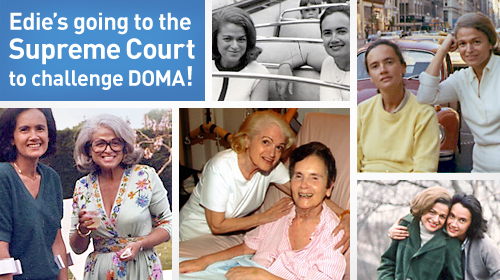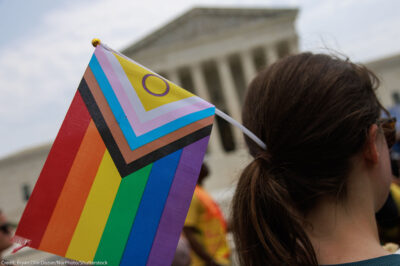
Of the many amici briefs filed to support marriage equality, the "Historian" brief, submitted by the American Historical Association along with 23 individual history professors, seeks to provide the proper historical context for the critical questions now facing the Supreme Court. As that brief explains, it is Defense of Marriage Act (DOMA) that is out of whack with our heritage, not the idea that states can recognize LGBT marriages.
For example, DOMA-supporters argue that DOMA is justified because a primary purpose of marriage in the United States has always been to provide a structure for parents raising children born of unintended pregnancies. This claim, however, has no historical basis. States have always encouraged marriages whether or not biological children would result. Perhaps the best example of this is our "First Family," establishing a non-biological family as a sound model for the nation. The "father of our country," George Washington was known to be sterile. Martha Custis brought two children from her first marriage into their household and they also later reared the children of her son, who died in the Revolutionary War. Are DOMA supporters really saying George shouldn't have been able to marry Martha?
Or how about the argument that DOMA is justified because the debate surrounding the freedom to marry arouses heated opposition of an intensity never seen before? Wrong again. States have always diverged in their own definitions of marriage, in ways that others thought were reprehensible. Some states, for example, allowed first cousin marriage, while others thought it incest. Some recognized common law marriage; some thought it "revolting." But the federal government always respected each state's choice, allowing them to be laboratories of change as understandings of family units evolved over time.
How about the "natural law" argument? Well, if you use that justification, then you are in the same company as one 19th-century state supreme court that argued against interracial marriages, , reasoning: "The natural law which forbids their intermarriage and that social amalgamation which leads to a corruption of races, is as clearly divine as that which imparted to them different natures." Similarly, in 1871, the now-eliminated concept of "coverture," in which a married woman essentially became her husband's property, was seen "in the law of nature, which gave strength to the man and feebleness and dependence to the woman."
The truth is marriage has always been an evolving institution. There's really only been one constant over the centuries in the U.S.: marriage must be a union between a couple entered into by free will. Indeed, Revolutionary-era statesmen saw consent-based monogamy with their republican form of government, and saw the voluntary bond of marriage as a model for the voluntary allegiance asked of American citizens.
Let's hope soon that every American citizen will be able to exercise that right of free choice.
Catherine R. Connors joined Pierce Atwood in 1986, where she practices primarily in the area of appellate litigation - both civil and criminal - in the federal and state courts, including petitions for review of administrative decisions. She has argued over 100 appeals, primarily in the United States Courts of Appeals and the Maine Supreme Judicial Court. Cathy also leads Pierce Atwood's partnership with the Gay & Lesbian Advocates & Defenders (GLAD).
Learn more about the Defense of Marriage Act and other civil liberty issues: Sign up for breaking news alerts, , and .



